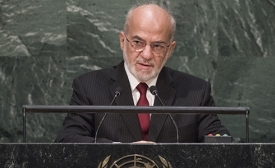terrorism
Part of the problem is that Muslim communities have yet to develop political literacy. They can learn much from non-governmental organizations about facilitating discussion, debate, building alliances, and forging constructive action. A few notable initiatives are under way. For example, the Noor Cultural Centre in Toronto regularly sponsors lectures and discussions about contemporary issues.
Netanyahu presented a color-coded world map and discussed Israel’s relations with a number of strategic states. “First of all” he exclaimed, “there is a huge change.” He pointed out that Israel is negotiating a free trade agreement with China, the second largest economy in the world. Israel’s exports to India increased by 30%, and with Japan, Israel has a defense and investment protection agreement.
The Obama administration has revamped a program designed to lure foreign fighters away from extremist groups like the Islamic State, focusing on a series of new advertisements and social media posts that seek to appeal to emotion rather than logic. Money for the program, which is managed by the State Department’s Global Engagement Center, tripled this year, to $16 million, after administration officials concluded that past efforts that had attempted to scare potential militants away from the extremist groups were not working.
One option is to cut the monster at its roots. This is the strategy adopted by Hollande, calling for stepped up anti-terrorism operations in Syria and Iraq. Eradicating the source of propaganda and erasing the motivations for terrorist acts is one of the few options left when the embedded enemy cannot be identified. However, this strategy is uncertain and will take time to yield results, which means France facing up to the prospect of similar attacks in the near future.


Philip Seib on writing his next book, Confronting Terrorism
What if the solutions to Europe’s most pressing problems lie not in politics or diplomacy, but in art and culture? With the European Union under pressure from economic stagnation, a wave of refugees, terror attacks and the possibility of Britain leaving the bloc, more than 150 cultural figures from 37 countries — including the actor Jude Law and the architect Rem Koolhaas — gathered here at a forum last week to explore that possibility.
Finding that the curse of unsupervised hate speech is rampant on the web and leads to terrorism, social media moguls Facebook, Microsoft, Twitter and YouTube have joined in signing a “Code of Conduct”. The document, produced by the European Commission (EC), states that these mega companies will dedicate manpower and algorithms to remove “illegal hate speech” within 24 hours.







